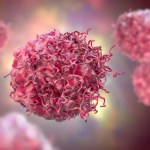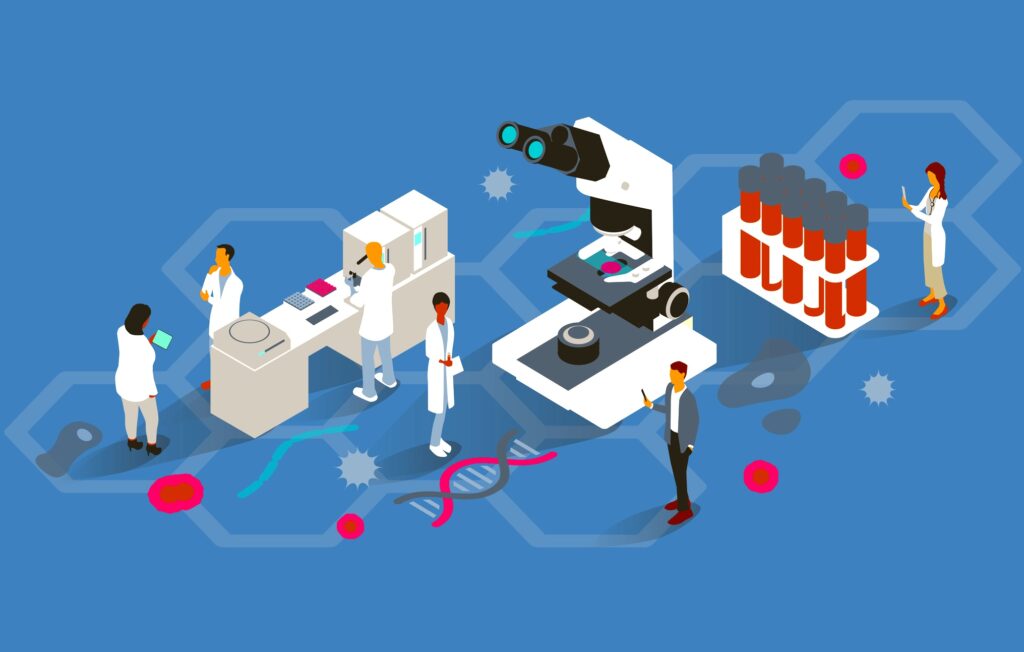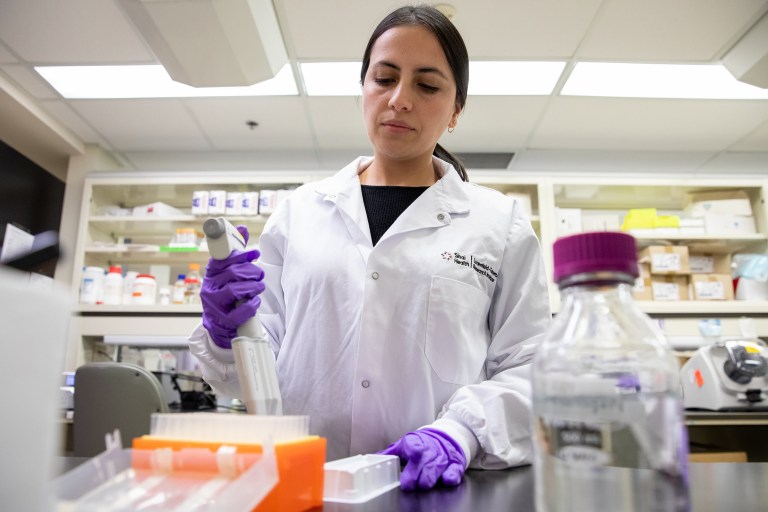Cancer affects millions of people every year — meaning many, if not most, of us have been personally impacted in some form by the disease.
Initiatives like World Cancer Day, celebrated annually on Feb. 4, work to raise awareness, educate the public, and advocate for action in humanity’s collective fight against the illness. And though there is not yet a cure, incredible advancements in cancer research, detection, and treatment are being made every day.
Those steps forward are offering new hope and promising continued progress in the field. To celebrate that progress, we rounded up some of the biggest wins and most exciting developments from the last couple of years. Scroll to learn more, and click here for helpful cancer prevention advice from two oncologists who spoke with Nice News.
New Screening Test Can Identify 18 Early-Stage Cancers

A team of researchers from biotech firm Novelna developed a simple blood protein test that enables experts to not only identify cancer in plasma samples, but also differentiate between early-stage cancer types with “high accuracy.”
The study involved 440 participants, both healthy people and those who had been diagnosed with one or more types of 18 solid tumors. The tumors tested represented cancers in all the main organs in the body.
Writing in the journal BMJ Oncology this January, the authors said their work “could be a starting point for developing a new generation of screening tests for the early detection of cancer,” adding: “These findings pave the way for a cost-effective, highly accurate, multi-cancer screening test that can be implemented on a population-wide scale.” Here’s how it works.
Novel Treatment Improves Outcome for Kids With Rare Brain Cancer

A new treatment for a type of rare and deadly pediatric neuroblastoma combined chemotherapy with an angiogenesis inhibitor, which blocks the growth of blood vessels that promote tumor growth. Researchers found that 26% of patients who received the dual treatment saw improvement, compared to 18% in a control group.
The 160 treated patients, with a median age of 5, enrolled in the Phase 2 clinical trial also saw better one-year progression-free survival rates.
Simon Gates, professor of biostatistics and clinical trials at the University of Birmingham in the U.K. and lead author of the study, called the results “very exciting.”
“Currently, the outcomes are really poor for children who get this horrible cancer and so even seemingly small increases in the chance that a patient is going to be able to shrink their tumors is significant,” he told The Independent, adding: “These results hopefully get us closer to finding treatments for children who develop neuroblastomas.”
Personalized Cancer Vaccines Are Being Developed

In October 2023, a potentially breakthrough vaccine for pancreatic cancer entered a Phase 2 clinical trial out of Memorial Sloan Kettering Cancer Center. The trial will evaluate whether the mRNA vaccine — which is customized for each of the approximately 260 enrolled patients at the center and sites around the world — prevents pancreatic cancer from returning after a tumor has been surgically removed. Get more details here.
An mRNA vaccine for melanoma is also in development by pharmaceutical companies Merck and Moderna, with the drug entering Phase 3 trials in July 2023. According to midstage data released in December, pairing it with Merck’s immunotherapy Keytruda cut the risk of relapse or death from the most deadly form of skin cancer by almost half, compared to Keytruda alone.
The vaccine could enter some markets by 2025, Moderna’s CEO told CNBC. The companies are also trialing it in patients with non-small cell lung cancer, and plan to expand to other types of tumors as well.
Another melanoma vaccine, this type called a TPLO and again specifically personalized to the patient receiving it, is nearing Phase 3 trials. It’s being developed by biotech company Orbis Health Solutions. Company founder Thomas Wagner told ABC News of the work: “People used to ask me the question, ‘When will there be a cure for cancer?’ And I’ve been doing this for 60 years and I could never answer that question,” Wagner said. “Until recently, until the last three or four or five years.”
Here are three more cancer vaccines to look out for.
Breakthrough Cancer-Fighting Drug Is “Gentler” Than Chemo

A new drug called blinatumomab, or blina, that has already been found to safely treat cancer in adults is now being used as an alternative to chemotherapy in children as well.
Unlike chemo, blina attacks only cancer cells, not the entire body, so it creates fewer detrimental side effects. And it can be administered through a battery-operated pump that the patient can take home, so they don’t have to remain in the hospital for treatment.
“Chemotherapies are poisons that kill the leukemic cells but also kill and damage normal cells — and that is what causes their side effects,” pediatric hematologist Ajay Vora told the BBC. “Blinatumomab is a gentler, kinder treatment.”
Blina is approved in the U.S. for both adults and pediatric patients with B-cell precursor acute lymphoblastic leukemia, but is only being used off-label for kids in the U.K. One of those children is an 11-year-old named Arthur, whose leukemia did not respond well to chemo. His family called blina “a little bit of sunshine” when compared to Arthur’s previous treatment — and he’s now cancer-free.
Scientists Identify “On/Off Switch” for Breast Cancer Metastasis

Over 80% of advanced breast cancers fail to respond to immunotherapies, but research out of Stanford University and the nonprofit Arc Institute has revealed one potential reason for the troubling statistic.
A team of scientists discovered a protein called ENPP1 that acts as a sort of “on/off switch” in breast cancer’s ability to both metastasize and resist immunotherapy. Publishing their findings in December 2023, they determined that ENPP1 is produced by healthy cells and cancer cells in and around a tumor, and that patients with high levels of the protein are linked to higher resistance to immunotherapy and greater instances of metastasis.
The results of the study could lead to more effective treatments and more accurate prognoses. “Our study should offer hope for everyone,” said biochemist and lead author Lingyin Li in a news release.
Quest to Cure Cancer in Golden Retrievers Advances Human Research, Too

Golden retrievers, known for being one of the most popular dog breeds, are, unfortunately, particularly susceptible to cancer. On a mission to understand why they’re at risk (and how to help them live longer), scientists have been studying their genes.
Through those efforts, they discovered a genetic variant associated with a longer lifespan of nearly two years, which is equivalent to an additional 12-14 years for humans, The Washington Post reported in November.
This research is directed “at one of life’s biggest mysteries, not just in dog science but in human health,” Elinor Karlsson, the director of vertebrate genomics at the Broad Institute of MIT and Harvard, said. “Why do some people live longer than others? Why do some dogs live longer than others? We don’t know why, but this study is starting to get at that question.”
The hope is that with more information, we’ll get closer to increasing our furry friends’ odds of living longer. “Almost all golden retriever owners understand this statistic and are passionate about finding a way to reduce the cancer rate in the breed they love,” added Kelly Diehl, the senior director of science communications for the Morris Animal Foundation.
RELATED: All Women Over 40 Should Be Getting Mammograms, New Breast Cancer Guidelines Urge — What to Know
AI Tool Identifies Lung Cancer More Accurately Than Traditional Tests

A team of U.K.-based researchers published a study in November 2022 on how AI can spot lung cancer, finding their algorithm to be more accurate than the current tests doctors use.
The algorithm was made using data from the CT scans of nearly 500 patients, all of which had large lung nodules. Researchers analyzed the scans via radiomics, “which can extract information about the patient’s disease from medical images that can’t be easily seen by the human eye,” a press release explained.
They used AUC, or “area under the curve,” to measure accuracy. Per the release, an AUC of 1 indicates perfection and 0.5 indicates random guessing. The AI tool the researchers developed had an AUC of 0.87 when it came to identifying cancerous lung nodules — higher than the Brock score, which clinics currently use and has an AUC of 0.67.
Though the AI research is still in early stages, it has big potential. “In the future, we hope it will improve early detection and potentially make cancer treatment more successful by highlighting high-risk patients and fast-tracking them to earlier intervention,” said lead author Benjamin Hunter.
Gene Identified as a Possible Target in Fatal, Treatment-Resistant Brain Cancer

A team of researchers at the University of California, Los Angeles identified a gene that plays a key role in the growth of glioblastoma multiforme, a rare and lethal brain cancer that has no known cure. The research suggests that focusing on this gene, called P300, could help provide a therapeutic target for GBM, which is highly resistant to standard chemotherapy.
Brain cancer is notoriously difficult to treat. David Largaespada, a cancer researcher at Masonic Cancer Center, explained to M Health Fairview that “the tumor cells that we need to kill are behind this blood brain barrier, so many potentially useful drugs never actually get to them.”
This makes UCLA’s findings — published in Nature Communications in October 2022 — a possible breakthrough discovery.
Read more about it here.
RELATED: Device the Size of a Pencil Eraser Kills Cancer and Prevents It From Returning, Study Finds











